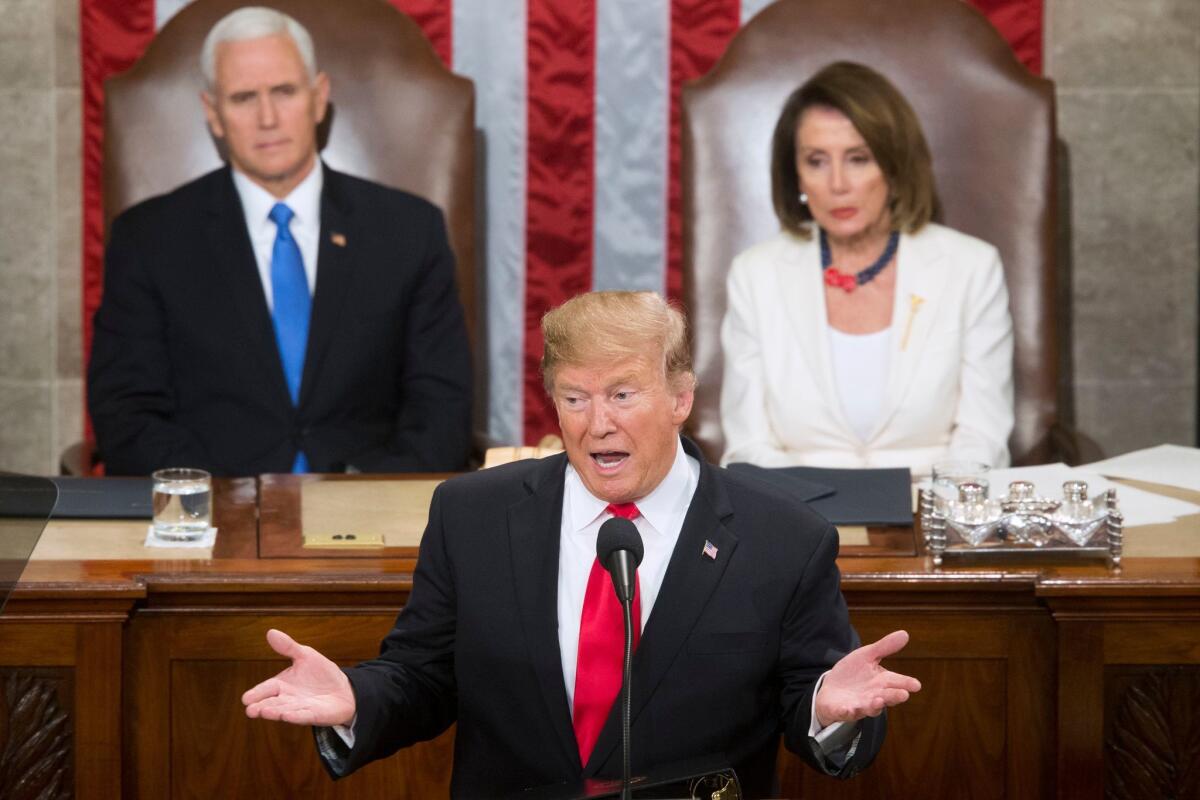Trump’s State of the Union won’t matter

- Share via
President Trump would like his State of the Union address to be a reelection springboard and an impeachment victory lap. But as far as the public is concerned, it may be more of an afterthought.
Since the 1960s, when Lyndon Johnson moved the president’s annual message to Congress from daytime to nighttime, and especially since the 1980s, when Ronald Reagan used Hollywood stagecraft to make the address a television-age spectacle, the news media have treated the State of the Union as the president’s big chance to define his agenda for the coming year. But the State of the Union isn’t big anything these days. Whatever headlines greet Trump on Wednesday morning most likely won’t have much relevance come November.
The main reason for the speech’s diminishing importance is the eclipse of network television as the main vehicle for Americans to follow politics. Once broadcast overtook print as the prime medium for news consumption, a burgeoning political spin machine turned the once-sedate annual affair into a prime-time extravaganza. White House impresarios deployed pollsters to develop themes, speechwriters to smith the words, and image-makers to supervise details from the guests in the gallery to the color of the presidential tie. As cable and then the internet provided alternatives to network TV, the reach of the speech lessened. Each new president, to be sure, enjoyed a bump from curious viewers who tuned in to see what he had to offer, but the ratings crept downward after that.
Trump has been something of an exception so far, holding steady at about 46 million viewers for his three annual messages (the first of which was not technically labeled a State of the Union address), but he still has never bested the high numbers registered by Presidents Obama (52 million), George W. Bush (62 million) or Clinton (67 million). The long-term decline is clear: Fewer people watched Trump’s initial speech than Obama’s; fewer saw Obama’s than Bush’s; and fewer saw Bush’s than Clinton’s.
And those who will make it a point to watch Tuesday night won’t be paying rapt attention. They are likely to have one eye on their Twitter feed or be scanning the web on a tablet while the president drones on. Were it not mandated by the Constitution, the White House and television itself might simply decline to do another State of the Union — and even the Constitution these days isn’t looking quite like the firewall it once did.
Besides the proliferation of media choices, State of the Union speeches may also be a casualty of the disappearance of persuadable viewers. Traditionally presidents would pitch the address at that sizable swath of voters who lack rigid feelings toward the president, voters who might have some qualms about him but can be brought around if he gives voice to a winning, ambitious agenda. But in our polarized country, fewer politically open-minded citizens exist. The highly partisan nature of the impeachment proceedings reaffirmed that few Trump haters — or even skeptics — are going to be converted into admirers even by a boffo speech, and few of his defenders are likely to hear his policy agenda and flip Democratic.
It’s possible Trump’s viewership numbers will spike tonight because of curiosity about how he’ll deal with his impeachment and all-but-certain acquittal. But it’s also possible that a good chunk of the roughly one-half of the country that reviles Trump will ignore the speech, whether out of protest, disgust or weariness.
There’s yet another reason, too, that this year’s State of the Union isn’t likely to matter much. With impeachment finally coming to its close — however foregone the conclusion always was — and the Iowa caucuses finally arriving, Trump’s speech is at best the third biggest political story of the week. Throw in the Super Bowl and the coronavirus outbreak, and it’s unlikely that anything he says will be on many people’s lips come the weekend, let alone November. In fact, the news cycle has come to move so fast — our media agenda-setters flit from topic to topic with such haste — that even the impeachment probably won’t loom large in many voters’ minds in the general election.
Trump is delivering his big speech, then, at a time when the true state of the union is divided, angry and despairing of the possibility of reclaiming true deliberative democracy. All of which means that the State of the Union may well be irrelevant.
David Greenberg is a professor of history and journalism and media studies at Rutgers University. His latest book is “Republic of Spin: An Inside History of the American Presidency.”
More to Read
A cure for the common opinion
Get thought-provoking perspectives with our weekly newsletter.
You may occasionally receive promotional content from the Los Angeles Times.






